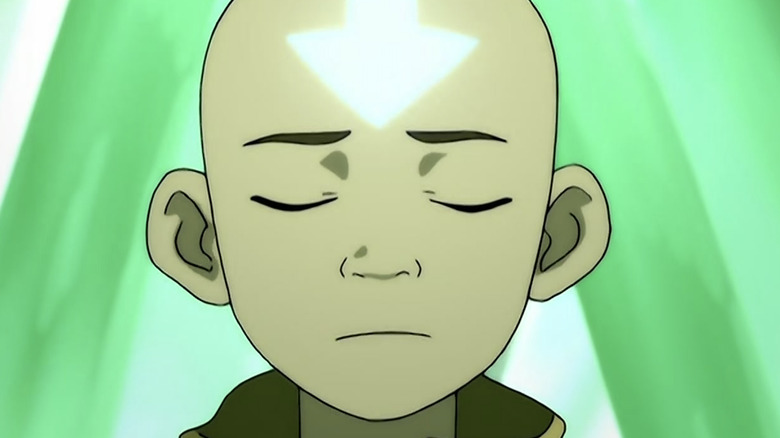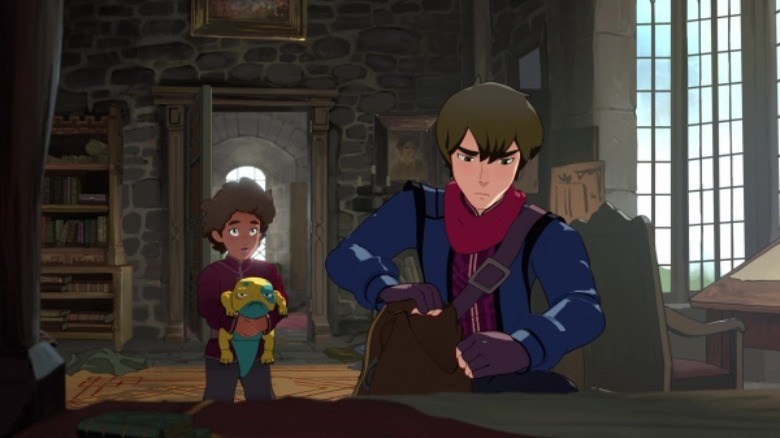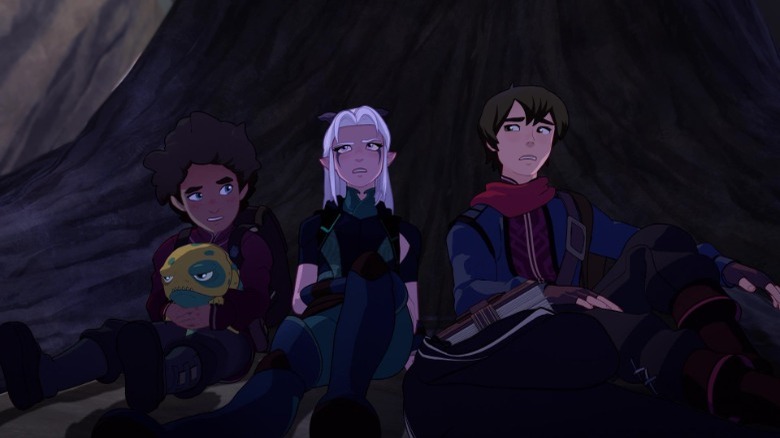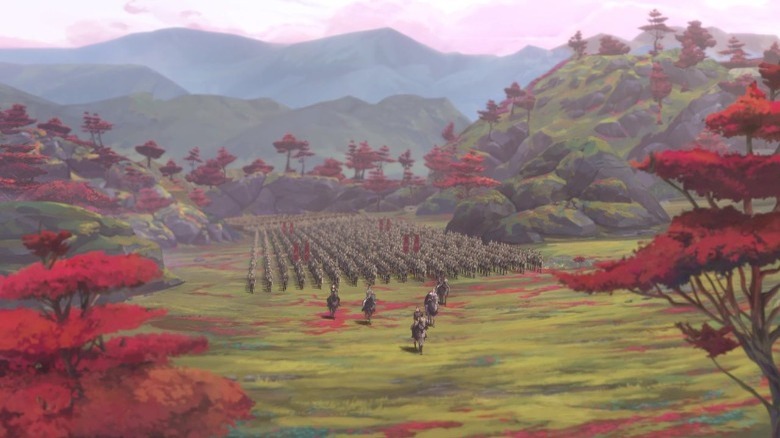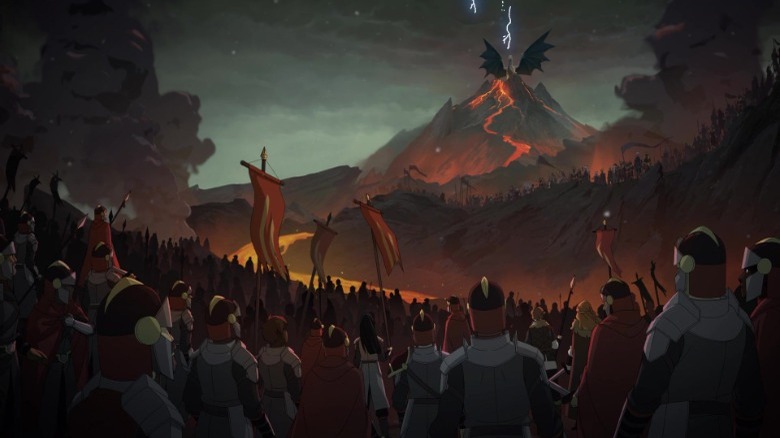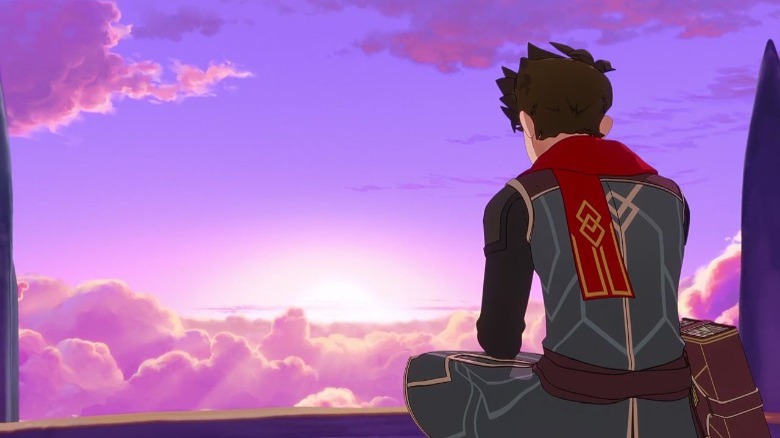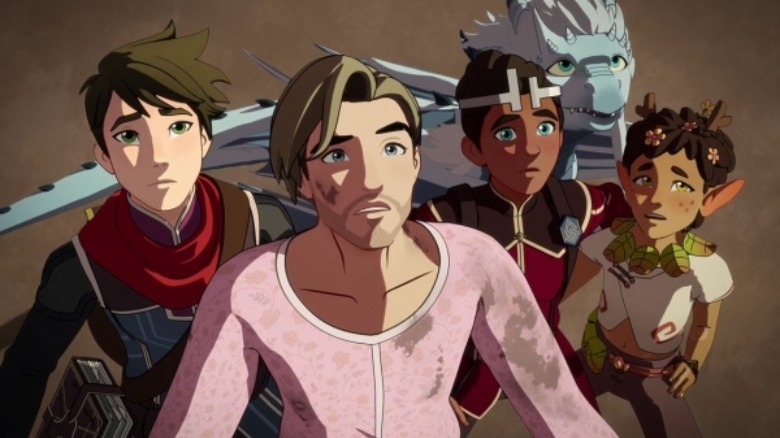Avatar: The Last Airbender Fans Living In Limbo Shouldn't Sleep On The Series' Spiritual Successor
The "Avatar: The Last Airbender" franchise has become a cultural mainstay, a centerpiece of the millennial and early Gen Z imagination. That, in and of itself, would be pretty damn mind-boggling for something that began with three seasons of a scrappy little Nickelodeon show — were it not for the fact that's exactly what you'd expect given the quality of the show in question. It's no secret at this point that the original "Avatar: The Last Airbender" is one of the greatest fantasy adventure shows of all time, animated or otherwise, and one of the most memorable and important American TV shows of the 21st century, and the stature of the franchise it's launched is no secret either. Just look at the amount of hype surrounding the two different "Avatar" series in development at different houses.
It's all the more impressive that the franchise has managed to cast such a long shadow after being gone from TV screens for so long. "The Legend of Korra," the imperfect yet rousing and consistently surprising follow-up to "The Last Airbender," wrapped up in 2014 after a tumultuous four-season run. In the near-decade since, fans of "Avatar" have been essentially living in limbo, with plenty of new animated entries in the fantasy adventure genre delivering thrills, pathos, and visual splendor without quite recapturing what made the Nickelodeon franchise so powerful. Or at least that was the case until Netflix's "The Dragon Prince."
The Dragon Prince is an action fantasy show from one of the masterminds behind The Last Airbender
Like all great television series, "Avatar: The Last Airbender" came from an auspicious meeting of minds. Creators Michael Dante DiMartino and Bryan Konietzko naturally had a big hand in developing the grand vision underneath it all, and master directors like Giancarlo Volpe, Lauren MacMullan, and Joaquim Dos Santos helped establish the show's unique look, tone, and pacing and keep it consistent across three seasons. But one contribution that cannot be understated is that of Aaron Ehasz, who, as the show's co-executive producer and head writer throughout its entire run, not only oversaw "The Last Airbender'"s legendarily perfect three-season narrative buildup and payoff, but also penned such iconic half-hours as "The Storm," "The Crossroads of Destiny," and Part 2 of "The Day of the Black Sun."
It's no wonder, then, that Ehasz's big brainchild following "Avatar" should be imbued with equally sterling writing. Co-created by Ehasz and Justin Richmond, who also wrote the majority of the show's episodes, "The Dragon Prince" follows the "Avatar" model of incredibly well-thought-out storytelling on a macro and micro level, with episodes always telling engrossing stories, and character arcs becoming ever richer as the plot gains more and more momentum. Much like "Avatar," "The Dragon Prince" is also split between different thematic "Books," structured around the complex mythos of a sprawling world where magic is drawn from nature. And the similarities don't stop there.
It's a show with the strengths of Avatar, but with its own unique slant
"The Dragon Prince" tells the story of the continent of Xadia, in which magic exists as a part of nature and can be derived from six sources: the Sun, the Moon, the Earth, the Stars, the Sky, and the Ocean. The residents of Xadia are divided between humans, elves, and dragons, all of whom used to live harmoniously until humans began to make up for their lack of access to natural magic by harnessing dark magic, i.e. magic extracted directly from the life force of magical beings. When the show begins, humans have been cast off to their own half of the continent, living separately from elves and dragons yet constantly trying to undermine their power, all of which has pushed the world to the brink of war.
If that setup sounds familiar to the warring Four Nations of "The Last Airbender," that's because it is, and Ehasz et al. once again know just how to take advantage of the dramatic, political, and moral juice inherent in such lofty high fantasy. But "The Dragon Prince" is far from a rehash. If anything, it takes the opportunity to explore avenues and ideas that the "Avatar" franchise, with its entropic philosophy and the clear-cut moral balance built into its very premise, has never really gotten to touch. There's no Fire Nation or Red Lotus here: The narrative territory braved by "The Dragon Prince" is much murkier.
The depiction of war is complex and harrowing
"The Dragon Prince" starts with a brewing conflict between humans and elves, one that has been passed on from generation to generation for centuries, and now bears down on a set of teen characters just as all-out war is about to erupt. There's Prince Callum, son of the human King Harrow of Katolis, who's cultivating a relationship with magic while contending with his father's legacy of authoring the murder of the dragon king Avizandum. There's Callum's younger half-brother, Prince Ezran, who must shoulder the responsibility of being next in line for the throne as an innocent, wide-eyed 10-year-old. And there's Rayla, a precocious Moonshadow Elf assassin who has all the skills to be perfect at her role in the war — except for the nerve to actually kill someone.
The series lays out the reasons for the war as basically understandable. The Elves' natural access to magic gives them an edge over the humans, whom they consider inferior; humans are pushed to get their hands on magic at any cost to assert themselves, and hunger for power drives them over the edge; violence begets violence. But the more understandable the show's war is made, the more undeniably harrowing its consequences become. The mission of Callum, Ezran, and Rayla becomes not just to oppose a certain side in the war, but to somehow find a way out of a bitter thousand-year conflict — all while finding their own footing in a messy, dangerous, often ugly world.
The world-building is incredible
One of the things that made "Avatar: The Last Airbender" such a lush, endlessly rewarding viewing experience was the depth and variety of its world-building. The history, philosophy, anthropology, sociopolitical mechanics, and ecology of the Four Nations were planned carefully from the start and teased out in careful doses that always left us wanting more; when "The Legend of Korra" came around, half the fun of it lay in discovering how the "Avatar" world had changed in the intervening years. The franchise was, above all, a feat of transportation that virtually no other high-profile fantasy series since has been able to match — not even "Game of Thrones," which, for all its strengths, didn't always take full advantage of George R.R. Martin's studious conception of Westeros.
Fans of "Avatar" will, then, be happy to discover that "The Dragon Prince" gives it a run for its money when it comes to world-building. It has that unique quality of fashioning a world that feels bigger than the sum of individual characters or scenes, always with more on the horizon to discover and understand. The magic system, with its carefully organized rules and its savvy appeal to primal nodes of the relationship between man and nature, feels exciting and rife with possibility — it should come as no surprise that the series has inspired a vast amount of fan fiction. And the history of dragons hovers over the human-elf conflict like a great wealth of ancient secrets waiting to be braved.
The animation and production design are its own spectacle
Of course, no amount of world-building means much without the visual splendor to match. At first, that department constituted a bit of a growing pain for "The Dragon Prince," which made a stylistic choice to favor rougher, low-framerate animation in Book 1, yielding decidedly mixed results. But Ehasz, Richmond, and the animators listened to fan feedback and changed course from Book 2 onward (via Polygon); now, thankfully, "The Dragon Prince," with its 2D-imitating CGI animation overseen by Bardel Entertainment, is as much an aesthetic feat as it is a narrative one.
The character designs, to start off, carry on the "Avatar" tradition of drawing from anime and Asian art at large to create uniquely expressive faces, unmistakable styling choices, and striking body language. On that note, since its Season 2 recalibration, the animation itself has become smooth, fluid, and altogether dazzling, with the mélange of CGI and cel contours yielding movement and "cinematography" at once endearingly intuitive and satisfyingly vivid, complete with cinematic lighting.
In contrast to the earthier, parchment-esque color palette of "The Last Airbender," the colors of "The Dragon Prince" take on vibrancy and intensity befitting its magical setting, and contribute to frequent feats of sheer visual spectacle on par with any animated series in the past two decades. And that's not even getting into the brilliant product design, which ensures that the show's world always feels as breathtaking in practice as it's designed to be on paper.
The series is on an upward curve of excellence
In all honesty, "Avatar: The Last Airbender" did have an advantage that many shows don't: An open-and-shut, clearly-delineated story to tell in just the necessary amount of time. There were hardly ever any aimless patches or "filler" episodes on "The Last Airbender;" the whole show was always moving towards a specific destination. (Incidentally, "Korra" often suffered exactly because it operated without an overarching game plan, renewing the plot as it went along.) In that sense, "The Dragon Prince" offers an opportunity that "The Last Airbender" fans should cherish: The opportunity to witness a similarly deliberate and well-planned narrative play out over a significantly longer scope.
The plan for the "Dragon Prince" saga was always to span seven seasons, broadly corresponding to the seven sources of magic, and covering the full breadth of its world's political and cultural transformation. This has become especially apparent in Season 4, the show's strongest yet, which takes place after a two-year time jump and raises the stakes higher than they've ever been. And, now that Netflix has renewed "The Dragon Prince" for its intended seven total seasons (via Polygon), it's all a matter of sitting back and letting Ehasz, Richmond, and company carry out the climatic back half of their hugely ambitious vision. If you haven't jumped on board yet, now's the best possible time to do so; in all likelihood, the number of people freaking out over "The Dragon Prince" will only grow in the coming years.
